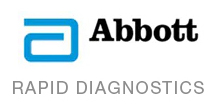Find SARS-CoV-2 testing kits, including tests, reagents, controls, and more from top brands to help diagnose COVID-19 in patients who show signs or symptoms or may have had exposure to the virus. Browse a wide selection of industry-leading products, including molecular methods, antigen detection, and serological tests in CLIA-waived, moderate, or high-complexity assays.
Test Methodologies
Choose from two different types of SARS-CoV-2 testing kits depending on your needs: antigen-based or nucleic acid amplification tests (NAATs). Diagnostic tests for viral antigens or RNA indicate a current infection.
COVID-19 test kits that use antigen assays typically detect nucleocapsid proteins from the virus. These tests may use fluorescent immunoassay, immunochromatographic, or lateral flow techniques to produce rapid and accurate results, typically in less than 30 minutes.
For most of these tests, a conjugated or biotinylated antibody to the SARS-CoV-2 antigens is embedded in the test strip or device. If antigens are present in the sample, they react and bind to the antibodies, forming an antibody-antigen complex. This complex migrates across the test strip to the reaction area where secondary antibodies or other reagents have been bound to the membrane.
When the complex reaches the “test” area of the device, it reacts to create a color or other change that indicates a positive result. Most of these tests also have an internal “control” area to indicate the successful and complete migration of the antibody-antigen complex.
COVID-19 test kits that are considered NAATs use the polymerase chain reaction (PCR) process to make copies of any viral ribonucleic acids (RNA) that have been collected from the patient. Even minute amounts of viral RNA can be duplicated or amplified to produce enough material for testing.
Specimens from the upper or lower respiratory tracts can be tested using SARS-CoV-2 NAATs. Specific specimen requirements vary by manufacturer. Nasal or nasopharyngeal swabs or nasal washes or aspirates are common.
NAATs use a variety of amplification methods, including:
- Reverse transcription polymerase chain reaction (RT-PCR)
- Isothermal amplification methods
- Nicking endonuclease amplification reaction (NEAR)
- Transcription-mediated amplification (TMA)
- Loop-mediated isothermal amplification (LAMP)
- Helicase-dependent amplification (HDA)
- Clustered regularly interspaced short palindromic repeats (CRISPR)
- Strand displacement amplification (SDA)
During the COVID-19 pandemic, several types of NAATs have been authorized for emergency use by the U.S. Food and Drug Administration (FDA). They are categorized based on their CLIA complexity, which indicates the level of personnel training needed to successfully perform the tests. Some must be performed in clinical laboratories, while others are suitable for rapid or point-of-care (POC) use or can be self-administered.
The sensitivity for NAATs also varies by method. Laboratory-based NAATs are generally more sensitive than POC or self-administered tests and are often used to confirm the results of less sensitive assays.
What Is SARS-CoV-2?
COVID-19 emerged at the end of 2019 as a disease caused by the SARS-CoV-2 virus. Symptoms range from mild to severe and typically appear between two and 14 days after exposure. They include fever or chills, cough, shortness of breath or difficulty breathing, fatigue, muscle or body aches, headache, loss of taste or smell, sore throat, congestion or runny nose, nausea or vomiting, and diarrhea.
Who and When to Test
COVID-19 test kits can be used to test patients who meet the following criteria:
- Anyone with signs or symptoms of COVID-19, regardless of vaccination status or prior infection
- People who have had close contact with someone with confirmed COVID-19
- Fully vaccinated people three to five days after a known exposure to someone with suspected or confirmed COVID-19
- Unvaccinated people who have traveled, attended large social or mass gatherings, been in crowded or poorly ventilated indoor settings, or in other settings where social distancing was not practiced










